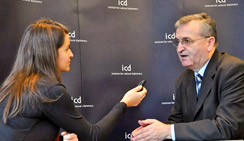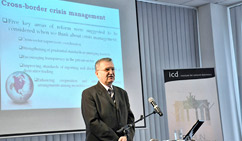The Berlin International Economics Congress
An Interdisciplinary Analysis of the Roles of Global Politics & Civil Society in International Economics


Dr. Vasile Puscas - CV - EN »
Dr. Vasile Puscas - Managing the Post Crisis Global Economic Interdependence »
Dr. Vasile Puscas
Romanian Minister for Foreign Affairs
Dr. Vasile Puscas, politician, diplomat and renowned International Relations scholar is highly thought of in the Romanian as well as European arena. In 2001, he became a member of the Social Democratic Party and was deputy in the 2000-2004 and 2004-2008 legislative terms, during which he was made the Chief Negotiator with the EU and Minister Delegate with the Ministry of European Integration. The former Chief Negotiator with the European Union (EU) succeeded Aurel Ciobanu-Dordea and in December 2008 became the Romanian Minister for European Affairs.
Many consider Puscas to be the key force to Romania’s accession to the EU. Since the Romanian Revolution in 1989 and the collapse of communism, it was every government’s goal for Romania to strengthen their relationship with Western democracies and the EU. After having signed its Europe Agreement in 1993 and submitted its official application in 1995, it signed the Snagov Declaration, declaring full support for membership from Romania’s political parties. Once Romania fulfilled the Copenhagen criteria, they were granted full accession on January 1st 2007.
Born in 1952, Puscas obtained a degree in history and social sciences at Babes Bolyai University of Cluj-Napoca in 1976. In 1991, he pursued his interests further to complete a doctorate in history. His long career in the academic sector began at the University of Babes-Bolyai. Between 1979 and 1990, he worked as an assistant professor and then as a lecturer and a pro-dean to the Faculty of History and Philosophy. In 1995, he became the Dean with the Faculty of Political Science and Public Administration. In that same year he was reader with the Department of Contemporary History and the professor of International Relations with the Faculty of History (until 2000). He then became the dean of the Faculty of Political Sciences of the Bogdan Voda University in 1998-2000.
Between 1990-1991, he was also the co-director of the Centre for Democracy and Post-Communist Studies in Bucharest and consultant with the Manfred Woerner Foundation. Furthermore, he has been the director of the Master’s Program for the Management of International Affairs with the Institute for International Studies (ISI) and of the Journalism and Communication Training Centre and director of ISI in Cluj-Napoca between 1999-2000.
Puscas became the Director of the Romanian Cultural Centre in New York in 1991-1992 and followed by becoming Minister-counsellor and interim ambassador with the Romanian Embassy in the USA till 1994. In addition, he has also been a valuable member of the Society of Romanian Historians, of the Academy for Political Science in New York and of the Russian, East European and Eurasian Centre at the University of Illinois.
The author of nine volumes, co-author of 16 books, 2 academic courses on European Integration (which would later become the basis for any political science university department) and 70 articles and essays, co-ordinator of the Politics Collection in the Dacia Publishing House, cluj-Napoca, editor of the International Politics and Diplomacy Collection in the Sincron Publishing House and of the special magazines Dosarele istoriei (History files) in Bucharest and the Central European Political Science Review in Budapest, he shares much of his wisdom and passion of his subject. His particular fields of interest are Central and Eastern Europe within International Relations in the 20th Century, its cultural history, as well as business relations and conflict management in Central and Eastern Europe in the 20th Century.
With his rich background in political science, he has emphasised the importance of Europe as a representation of a coherent and successful example of integration in a time of increasing global interdependence.






















































































